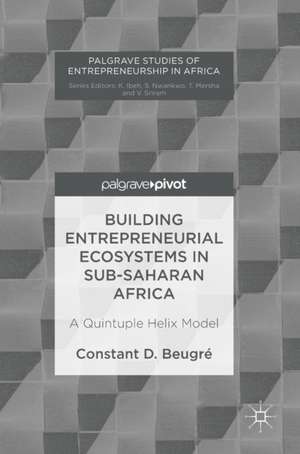Building Entrepreneurial Ecosystems in Sub-Saharan Africa: A Quintuple Helix Model: Palgrave Studies of Entrepreneurship in Africa
Autor Constant D. Beugréen Limba Engleză Hardback – 13 dec 2016
Africa suffers from two main diseases: poor management and a lack of vibrant entrepreneurial activity. The continent has the raw materials, the people, and the potential to be developed, and yet there remain barriers that prevent it from bettering itself.
To promote entrepreneurship as an engine of economic development and growth, the author has developed a Quintuple Helix Model which advocates mutual cooperation and information sharing among the five helices and provides valuable guidelines to policymakers on how to build entrepreneurship ecosystems in sub-Saharan Africa. It goes on to examine the roles that government, donors, and public and private sectors play and how Africans themselves might take the development of entrepreneurial societies into their own hands.
The book includes seven chapters that emphasize the key role that each of the five components could play in the development of entrepreneurial ecosystems. Entrepreneurship scholars, policy makers, and national and local governments of sub-Saharan Africa will value this insight as they strive to create a more favorable landscape for their citizenry.
Preț: 416.34 lei
Nou
Puncte Express: 625
Preț estimativ în valută:
79.67€ • 82.68$ • 66.60£
79.67€ • 82.68$ • 66.60£
Carte tipărită la comandă
Livrare economică 17-31 martie
Preluare comenzi: 021 569.72.76
Specificații
ISBN-13: 9781137568939
ISBN-10: 1137568933
Pagini: 108
Ilustrații: XI, 108 p. 4 illus., 3 illus. in color.
Dimensiuni: 148 x 210 x 14 mm
Greutate: 0.3 kg
Ediția:1st ed. 2017
Editura: Palgrave Macmillan US
Colecția Palgrave Macmillan
Seria Palgrave Studies of Entrepreneurship in Africa
Locul publicării:New York, United States
ISBN-10: 1137568933
Pagini: 108
Ilustrații: XI, 108 p. 4 illus., 3 illus. in color.
Dimensiuni: 148 x 210 x 14 mm
Greutate: 0.3 kg
Ediția:1st ed. 2017
Editura: Palgrave Macmillan US
Colecția Palgrave Macmillan
Seria Palgrave Studies of Entrepreneurship in Africa
Locul publicării:New York, United States
Cuprins
Introduction 1. The Economic Potential of sub-Saharan Africa 2. Defining and Entrepreneurial Ecosystem 2. The Need for Entrepreneurial Ecosystems in sub-Saharan Africa 3. The Role of Government in Building Entrepreneurial Ecosystems 4. The Role of Institutions of Higher Education 5. The Role of the Private Sector 6. The Role of Citizens 7. The Role of Donors and Development Agencies Chapter 8. Guidelines for Building Entrepreneurial Ecosystems in SSA Conclusion References Appendices
Notă biografică
Constant D. Beugré is Professor of Management and Entrepreneurship in the College of Business at Delaware State University, USA.
Textul de pe ultima copertă
This book argues that Africa suffers from two main diseases: poor management and a lack of vibrant entrepreneurial activity. Africa has the raw materials, the people, and the potential to be developed, and yet there remain barriers that prevent the continent from bettering itself. To promote entrepreneurship as an engine of economic development and growth, the author has developed a Quintuple Helix Model which advocates mutual cooperation and information sharing among the five helices and provides valuable guidelines to policymakers on how to build entrepreneurship ecosystems in sub-Saharan Africa. It goes on to examine the roles that government, donors, and public and private sectors play and how Africans themselves might take the development of entrepreneurial societies into their own hands.
The book includes seven chapters that emphasize the key role that each of the five components could play in the development of entrepreneurial ecosystems. Entrepreneurship scholars, policy makers, and national and local governments of sub-Saharan Africa will value this insight as they strive to create a more favorable landscape for their citizenry.
Constant D. Beugré is Professor of Management and Entrepreneurship in the College of Business at Delaware State University, USA.
Caracteristici
Explores the potential of entrepreneurship as solution to Africa’s stunted economic development Presents a Quintuple Helix Model of entrepreneurial ecosystems development A valuable guideline for forward-thinking policymakers








